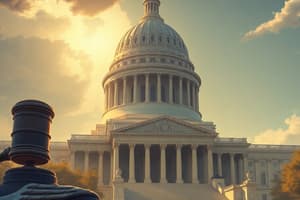Podcast
Questions and Answers
Which of the following is NOT a recognized defense in criminal cases?
Which of the following is NOT a recognized defense in criminal cases?
- Duress
- Mistake of fact
- Financial hardship (correct)
- Self-defense
Victims' rights are not considered in the legal process.
Victims' rights are not considered in the legal process.
False (B)
What is one factor that affects sentencing guidelines in criminal law?
What is one factor that affects sentencing guidelines in criminal law?
Severity of the crime
The stages of a typical criminal procedure include investigation, arrest, __________, pretrial motions, trial, sentencing, and appeal.
The stages of a typical criminal procedure include investigation, arrest, __________, pretrial motions, trial, sentencing, and appeal.
Match the following stages of the criminal process with their descriptions:
Match the following stages of the criminal process with their descriptions:
What does the Supremacy Clause establish?
What does the Supremacy Clause establish?
The Bill of Rights only protects the right to bear arms.
The Bill of Rights only protects the right to bear arms.
What principle ensures that individuals accused of crimes have the right to a fair trial?
What principle ensures that individuals accused of crimes have the right to a fair trial?
The Fourteenth Amendment includes both the ______ Clause and the ______ Clause.
The Fourteenth Amendment includes both the ______ Clause and the ______ Clause.
Match the concepts with their definitions:
Match the concepts with their definitions:
Which amendment is primarily associated with the protection against self-incrimination?
Which amendment is primarily associated with the protection against self-incrimination?
Landmark cases do not influence constitutional law.
Landmark cases do not influence constitutional law.
What does the principle of 'innocent until proven guilty' represent?
What does the principle of 'innocent until proven guilty' represent?
Flashcards
Criminal Law Stages
Criminal Law Stages
A series of steps in a criminal case, from investigation to appeal.
Criminal Defenses
Criminal Defenses
Legal arguments for why someone shouldn't be found guilty, e.g., self-defense or insanity.
Sentencing Variation
Sentencing Variation
Punishments differ based on crimes and locations.
Victim's Rights
Victim's Rights
Signup and view all the flashcards
Criminal Procedure
Criminal Procedure
Signup and view all the flashcards
Constitutional Rights
Constitutional Rights
Signup and view all the flashcards
Statutory Criminal Law
Statutory Criminal Law
Signup and view all the flashcards
Criminal Intent
Criminal Intent
Signup and view all the flashcards
Legal Precedent
Legal Precedent
Signup and view all the flashcards
Moral Culpability
Moral Culpability
Signup and view all the flashcards
Evidence in Criminal Cases
Evidence in Criminal Cases
Signup and view all the flashcards
Constitutional Law
Constitutional Law
Signup and view all the flashcards
Supremacy Clause
Supremacy Clause
Signup and view all the flashcards
Bill of Rights
Bill of Rights
Signup and view all the flashcards
Due Process Clause
Due Process Clause
Signup and view all the flashcards
Equal Protection Clause
Equal Protection Clause
Signup and view all the flashcards
Judicial Review
Judicial Review
Signup and view all the flashcards
Separation of Powers
Separation of Powers
Signup and view all the flashcards
Federalism
Federalism
Signup and view all the flashcards
Constitutional Amendments
Constitutional Amendments
Signup and view all the flashcards
Criminal Law
Criminal Law
Signup and view all the flashcards
Actus Reus
Actus Reus
Signup and view all the flashcards
Mens Rea
Mens Rea
Signup and view all the flashcards
Criminal Procedure
Criminal Procedure
Signup and view all the flashcards
Innocent Until Proven Guilty
Innocent Until Proven Guilty
Signup and view all the flashcards
Due Process Rights
Due Process Rights
Signup and view all the flashcards
Misdemeanor/Felony
Misdemeanor/Felony
Signup and view all the flashcards
Study Notes
Constitutional Law
- The U.S. Constitution establishes a framework for the federal government and defines fundamental rights.
- The Supremacy Clause asserts that federal law is supreme to state law when there is a conflict.
- The Bill of Rights safeguards individual liberties against government encroachment. These include but are not limited to, freedom of speech, religion, the press, and the right to bear arms.
- The Fourteenth Amendment's Due Process Clause and Equal Protection Clause ensures protection against state government actions.
- Judicial review, the power of the courts to interpret the Constitution, is a fundamental aspect of constitutional law. The Supreme Court plays a crucial role in shaping interpretations.
- Separation of powers among the legislative, executive, and judicial branches is a key principle intended to prevent tyranny and misuse of power.
- Federalism divides power between the federal and state governments, a balance that involves ongoing debate and interpretation.
- Constitutional amendments can modify the Constitution, reflecting societal changes and evolving interpretations over time.
- Landmark cases interpret and shape constitutional law. These cases frequently challenge established norms and principles.
- Constitutional law involves the application and interpretation of legal precedents and principles to current legal issues. It is an ongoing process of interpretation and application, influenced by social and political context.
- Constitutional law governs the establishment of procedures and limits to governmental power, affecting people's civil liberties and rights.
Criminal Law
- Criminal law defines offenses against society and prescribes penalties for their commission.
- Elements of a crime generally include the actus reus (guilty act) and the mens rea (guilty mind).
- Criminal procedure governs the process used to investigate, prosecute, and adjudicate criminal cases. This includes rules of evidence and arrest protocols.
- The principle of "innocent until proven guilty" is a cornerstone of the criminal justice system.
- Due process rights are guaranteed to individuals accused of crimes. These include the right to a fair trial, legal representation, and protection against self-incrimination.
- Different crimes have different classifications and penalties. These range from misdemeanors to felonies, affecting sentencing and consequences.
- The system generally involves stages of investigation, arrest, arraignment, pretrial motions, trial, sentencing, and appeal.
- Defenses in criminal cases can include self-defense, duress, insanity, and mistake of fact.
- Sentencing guidelines and punishment can vary widely depending on the severity of the crime and the jurisdiction.
- Victims' rights and their involvement in the legal process are increasingly recognized and considered.
- The structure and processes of criminal law are significantly impacted by legal precedent, legislative changes, and court decisions—often involving interpretation and application of constitutional rights. There is a complex interplay between constitutional rights and criminal procedure.
- Statutory law, legal codes, impacts the specific definition and prohibition of crime(s) with consequences.
- Criminal law often involves intricate questions of intent, evidence, and moral culpability.
Studying That Suits You
Use AI to generate personalized quizzes and flashcards to suit your learning preferences.




